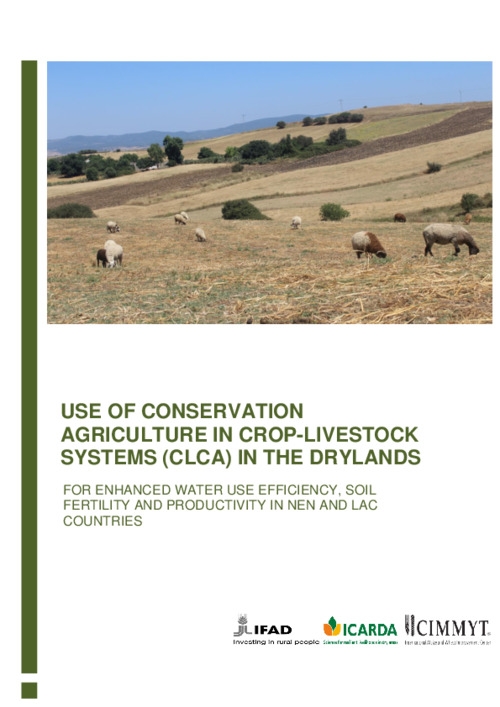Use of Conservation Agriculture in Crop-Livestock Systems (CLCA) in the Drylands for Enhanced Water Use Efficiency, Soil Fertility and Productivity in NEN and LAC Countries – Project Progress Report: Year I - April 2018 to March 2019
Abstract
The CLCA project goal is to sustainably increase production and enhance climate resilience of small farmers’ communities and their crop-livestock production systems in drylands. To develop in participation with smallholder crop-livestock producers contextually relevant and gender sensitive processes for enhancing the broad uptake of Conservation Agriculture (CA) within integrated crop-livestock systems in drylands in LAC (Andean drylands, Central American dry corridor and the northern South American savannah) and NEN (Near East and North Africa) regions. The expected outcomes are: i) 3,000 smallholder farmers reached (at least 40% women and 20% youth below 35 years) and 2,100 have directly adopted CLCA farming systems (in four (4) target countries) with increased production and improved cost-benefits optimized by filling research and development gaps; ii) At least six (6) NARES, in addition to decision makers, NGOs and IFAD loan project partners in the four (4) target countries have adopted tools and methodologies for reliable decision making and guide investments on contextually appropriate CLCA system; and iii) At least four (4) effective agricultural innovation systems – one (1) in each implementation area of the four (4) target countries - are coalesced in order to foster broad uptake of CA practices within integrated dryland crop-livestock production systems. 
Countries initially selected for the implementation of the project are Bolivia and Nicaragua in LAC and Algeria and Tunisia in North Africa. Through the IFAD investment projects and project partners, it is estimated that the training and adoption of technologies and practices for CLCA systems will reach an additional 10,000 small crop-livestock farmers. Other beneficiaries will be NARES (National Agricultural Research and Extension Services) and R&D partners and policy makers who will have access to innovative technologies and practices and knowledge on proven benefits of CLCA systems for climate resilience and sustainable intensification of production for crop-livestock farmers in drylands

